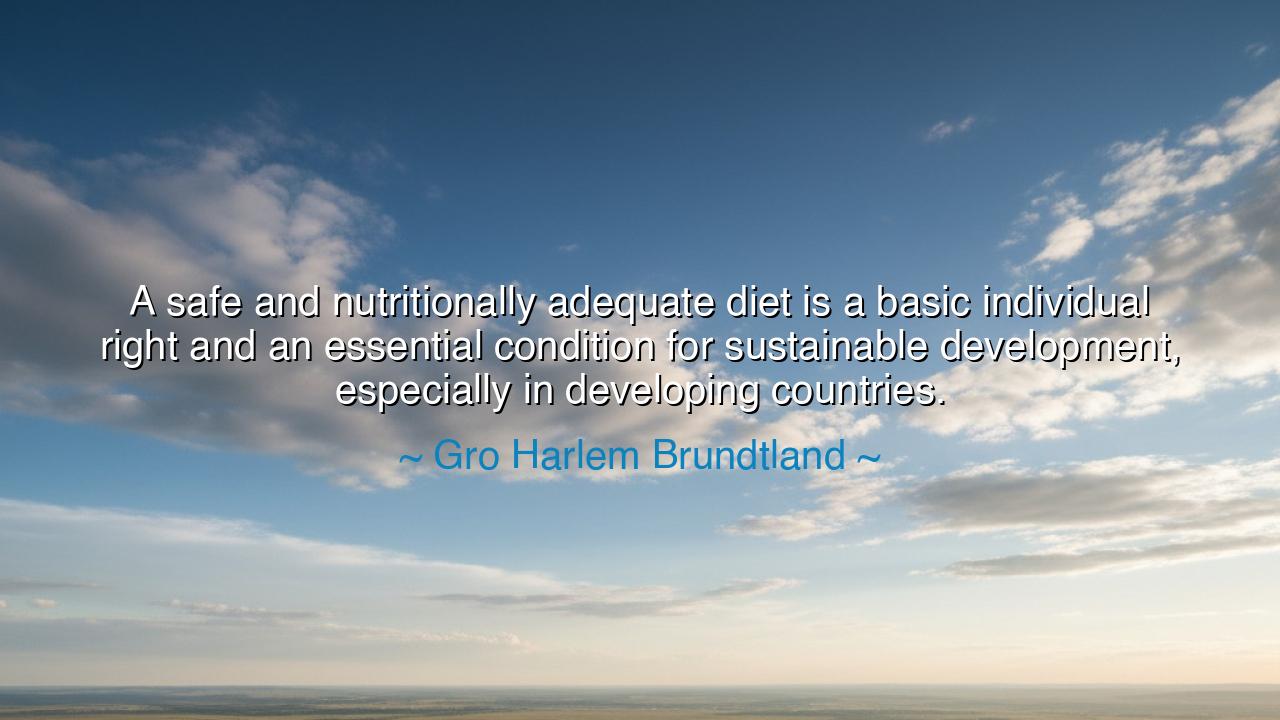
A safe and nutritionally adequate diet is a basic individual
A safe and nutritionally adequate diet is a basic individual right and an essential condition for sustainable development, especially in developing countries.






In the words of Gro Harlem Brundtland, “A safe and nutritionally adequate diet is a basic individual right and an essential condition for sustainable development, especially in developing countries,” we hear not merely the voice of a leader, but the echo of a universal truth that reaches across centuries — that the nourishment of the body is the foundation of the nourishment of civilization itself. Her words, though spoken in the language of modern governance, carry the spirit of ancient wisdom: that food is sacred, that to deny it in safety and sufficiency is to deny the dignity of human life. It is a declaration not of luxury, but of justice — that the right to eat well, to live in health, and to grow strong is as fundamental as the right to breathe or to be free.
To say that a nutritionally adequate diet is a basic individual right is to affirm that health is not a privilege of the fortunate, but a responsibility of humanity itself. The ancients knew this truth deeply. In the Laws of Hammurabi, the king was charged not only with justice in courts but with ensuring that his people had grain in their granaries. The Egyptians, who worshiped the Nile, saw the river’s flooding not merely as a natural event, but as a covenant with the divine — a sign that the gods willed life to continue through abundance. Likewise, Brundtland reminds us that no society can call itself just while any of its people hunger, and that progress built upon malnutrition is but a hollow illusion.
Her words also carry the wisdom of the healer, for before she was a stateswoman, she was a physician — one who saw firsthand that sustainable development is not born from wealth alone, but from health and stability. A nation may build cities and machines, but without nourished bodies and clear minds, its spirit collapses. The ancients understood this balance. In ancient China, the sage Mencius wrote that when rulers ignored the hunger of their people, rebellion followed — not from wickedness, but from despair. “The people,” he said, “are the foundation of the state; food is their heaven.” Brundtland’s vision continues that lineage of truth: that development without nourishment is like a house built on sand — impressive to the eye, but doomed to crumble.
When she speaks of the right to a safe diet, she speaks also of purity — not only in what is eaten, but in how it is grown, prepared, and shared. Safety means freedom from contamination, from poisons and pollutants that turn sustenance into sickness. The ancients, too, saw purity in food as a mirror of purity in soul. The Greeks honored Demeter, goddess of the harvest, with rituals that reminded them that food must be treated with reverence, not exploitation. To taint the earth, to waste her bounty, or to hoard her gifts was an act of sacrilege. Likewise, in Brundtland’s vision, the care of the land and the care of the body are bound together — one cannot be safe while the other is neglected. Environmental stewardship and human health are two roots of the same tree.
The words “especially in developing countries” strike the heart with compassion and urgency. For it is among the poor that the ancient injustice of hunger still reigns — not from lack of abundance in the world, but from imbalance in its sharing. History is filled with tales of plenty coexisting with famine: empires where the rich dined in splendor while peasants starved beneath their walls. The French Revolution was not born in salons or palaces, but in breadlines, when hunger became louder than fear. Brundtland’s warning is timeless: a world divided between those who eat too much and those who cannot eat at all cannot endure in peace. Sustainability must begin with equity.
Consider the story of Emperor Ashoka of ancient India, who, after years of conquest, turned from war to welfare. He decreed that no man or animal in his empire should hunger; he built granaries, irrigation systems, and kitchens for the poor. He understood that a ruler’s greatness was not measured by the lands he conquered, but by the lives he nourished. His empire endured not through fear, but through compassion. Brundtland’s vision is of this same spirit — a world where nourishment, safety, and justice sustain both people and planet. For when every individual has access to healthful food, humanity itself becomes stronger, wiser, and more enduring.
Let this be the lesson passed down to all who would shape the future: food is not a commodity; it is the breath of civilization. To ensure that every child, every family, every nation has access to safe and nourishing food is not charity — it is duty. It is the foundation upon which peace, prosperity, and wisdom are built. Therefore, honor the earth that feeds you. Waste nothing. Grow what you can. Support those who toil in the soil. And demand that leaders treat nourishment not as a privilege, but as a promise kept to all.
Thus, the wisdom of Gro Harlem Brundtland shines as a beacon for the generations — a reminder that the health of nations begins in the health of their people, and the health of their people begins at the table. For in the end, a safe and adequate diet is not only the sustenance of the body — it is the seed from which justice, peace, and the very continuance of life spring eternal.






AAdministratorAdministrator
Welcome, honored guests. Please leave a comment, we will respond soon